One thing we like to say at Tinybird, and we say it a lot, is that “Speed Wins”.
We believe in the compounding power of speed as the defining characteristic of any market leader, and we apply it to everything in business.
Faster decision-making leads to faster iteration and faster feedback loops. Companies sometimes agonize over decisions that are very reversible, and creating a culture of iterating faster helps you get ahead.
Faster decision making leads to faster iteration. It's a better feedback loop.
Most of the time faster queries lead to less infrastructure and money that you can invest elsewhere. If you think about queries that take one second each and you had to do one thousand queries per second, that means you need a thousand CPU cores to get all of those queries through. But if you manage to get those down to 100 milliseconds, you need 10 times less infrastructure to do exactly the same thing.
Faster queries lead to less infrastructure, money you can invest elsewhere.
Faster UIs lead to better user experience and happier customers. We can just think about how long you're willing to wait for a web page to load these days. We can deal with ads, we can deal with pop-ups, and cookie alerts, but waiting for 10 seconds for a page to load? There’s no way.
Faster UIs lead to better UX and happier customers.
A faster developer experience leads to faster shipping, and shipping faster CI, faster queries, less turning of the knobs and fine-tuning, more time shipping, and more things shipped.
Faster developer experience leads to faster shipping.
Sam Altman, talking about generative AI, said this a couple of years ago: “The world is going to move faster and faster from here on. People and institutions who embrace this will be richly rewarded. People and institutions who do not or cannot are going to be challenged. Adaptability and speed have gone from valuable to critical.”
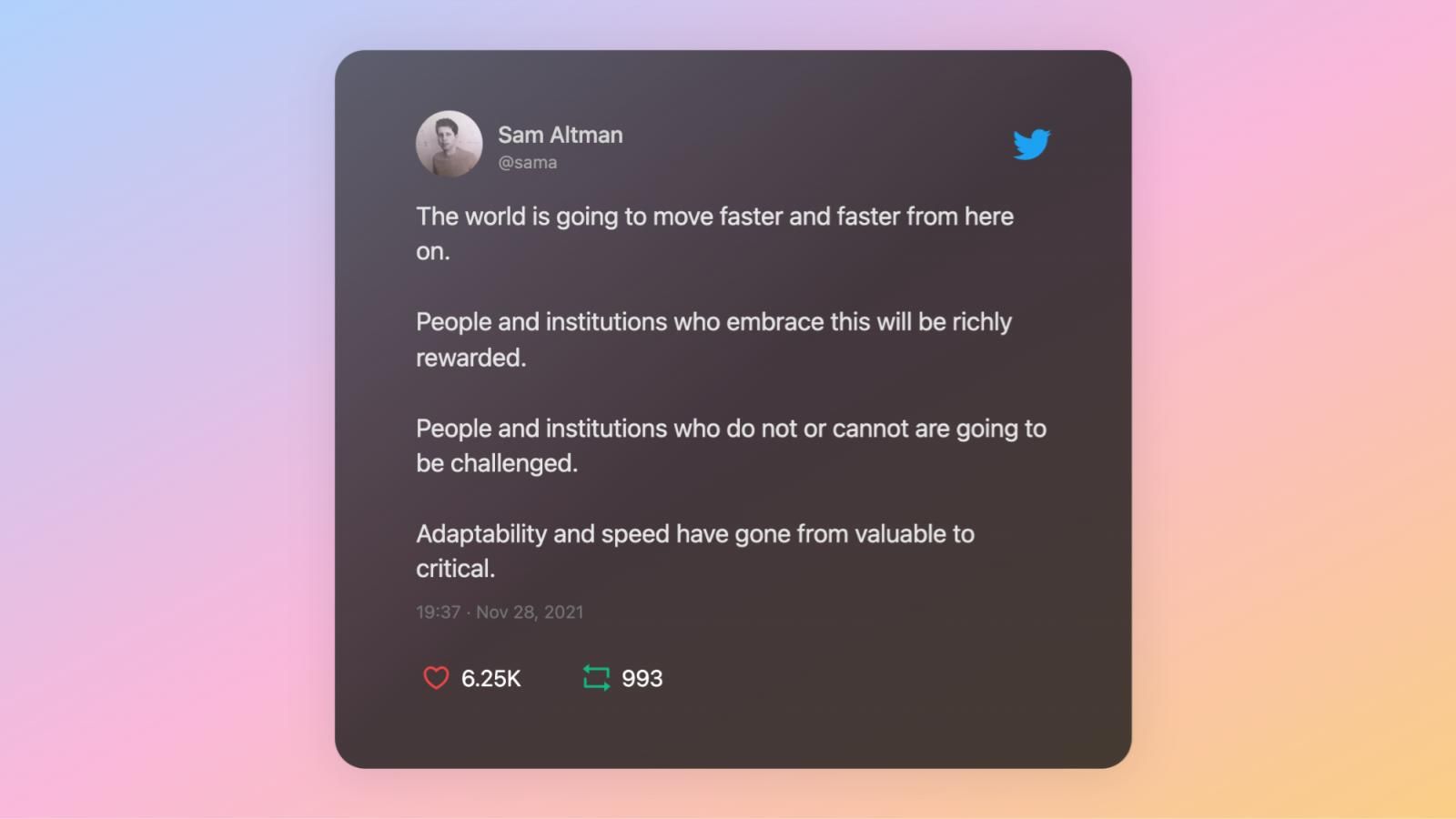
Obviously, you can tweet like that when you're Sam Altman, but I thought this was a perfect tweet for the message here.
So, “speed wins”, and the interesting thing that’s happening is that speed is actually becoming table stakes. Speed is becoming something that you need in order to compete in almost any market, and more and more we see developer experience wins, and we see that speed to market wins.
More and more, we see that developer experience wins, and speed to market wins.
The ability to do more with less, faster, is gaining traction. And that's what we sell, and that’s why I'm talking about it here.
Let me show you what I mean by this. Some of the developers and data engineers that we talk to, more and more are looking to focus on the developer experience in terms of all the things that remove obstacles from their way, all of the things that enable them to focus on what they're trying to do.
For example, to build search you don't necessarily need Elasticsearch. You maybe need Algolia, if that's what you're looking for, and you're focusing on building great search. You don't have to build everything around what you need in order to operate a complete search infrastructure. You might just need Algolia.
To build search, you don't need Elasticsearch. You need Algolia.
To deploy applications, you might not need EC2. You might need Vercel. If you want to develop faster, if you want to remove handoffs from the process, and if you want to get to market faster, then that's probably a better option.
To deploy applications, you don't need EC2. You need Vercel.
And for real-time analytics, you don't necessarily need ClickHouse® or an OLAP database and everything that comes with it. What you need is Tinybird.
To build real-time analytics, you don't need ClickHouse®. You need Tinybird.
What we see more and more is that data teams are under pressure to deliver more and to deliver faster user experiences for their companies. There are more and more answers coming from the business. There's also more and more functionality that needs to be built into the products, and there's more pressure to do it over fresh data. What was fine a few years ago, to have a day of latency, is no longer possible. And anytime that a competitor of yours essentially goes real-time, they're gaining a competitive advantage because they can react faster to opportunities, and they can react faster to problems.
So what we see is that the modern data stack is incredibly fragmented and is not well suited for real-time use cases when you want to work with fresh data and do it at scale.
The modern data stack is incredibly fragmented and not suited for real-time use cases with fresh data at scale.
This is just a little diagram that shows the status quo of pretty much a lot of the things that we see.
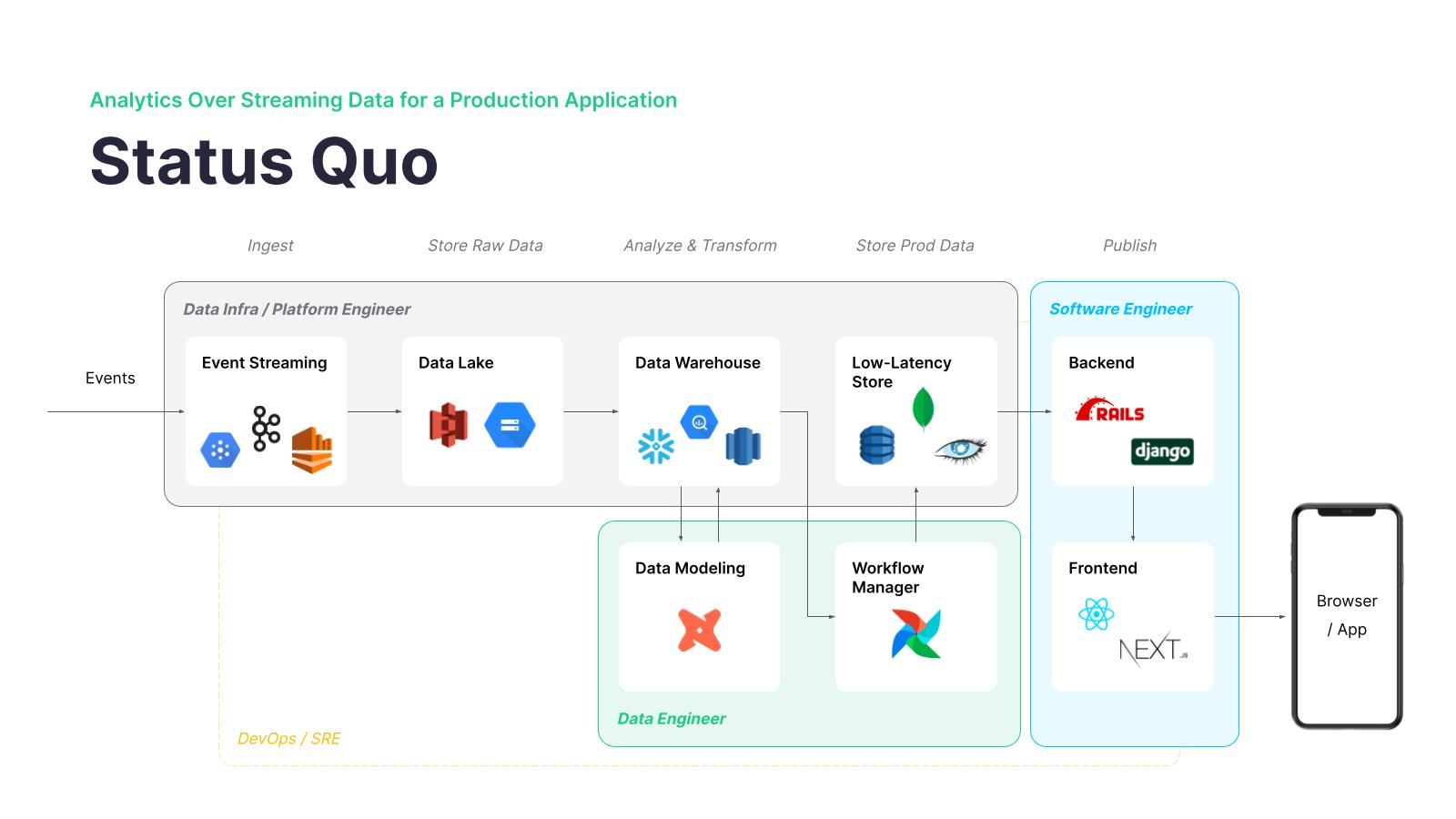
You have maybe Kafka capturing data, going into a data warehouse, then some tooling to model your data according to your business needs, and then if you want to build something on top of that data you have Airflow or something like that will move it into some low-latency database, and then you still need to build an application and APIs and a backend and a front-end.
And if you look at all the handoffs that need to happen not just from thing to thing but also from the moment that data gets generated until it's available to be queried, it is very, very difficult to work in real-time with an infrastructure like that.
When you look at all the technical handoffs with the "modern data stack", it's nearly impossible to go fast.
So here's where Tinybird comes in. What we enable is the ability to develop low-latency and highly concurrent APIs over data in real-time, at any scale, without having to worry about infrastructure, and just using SQL.
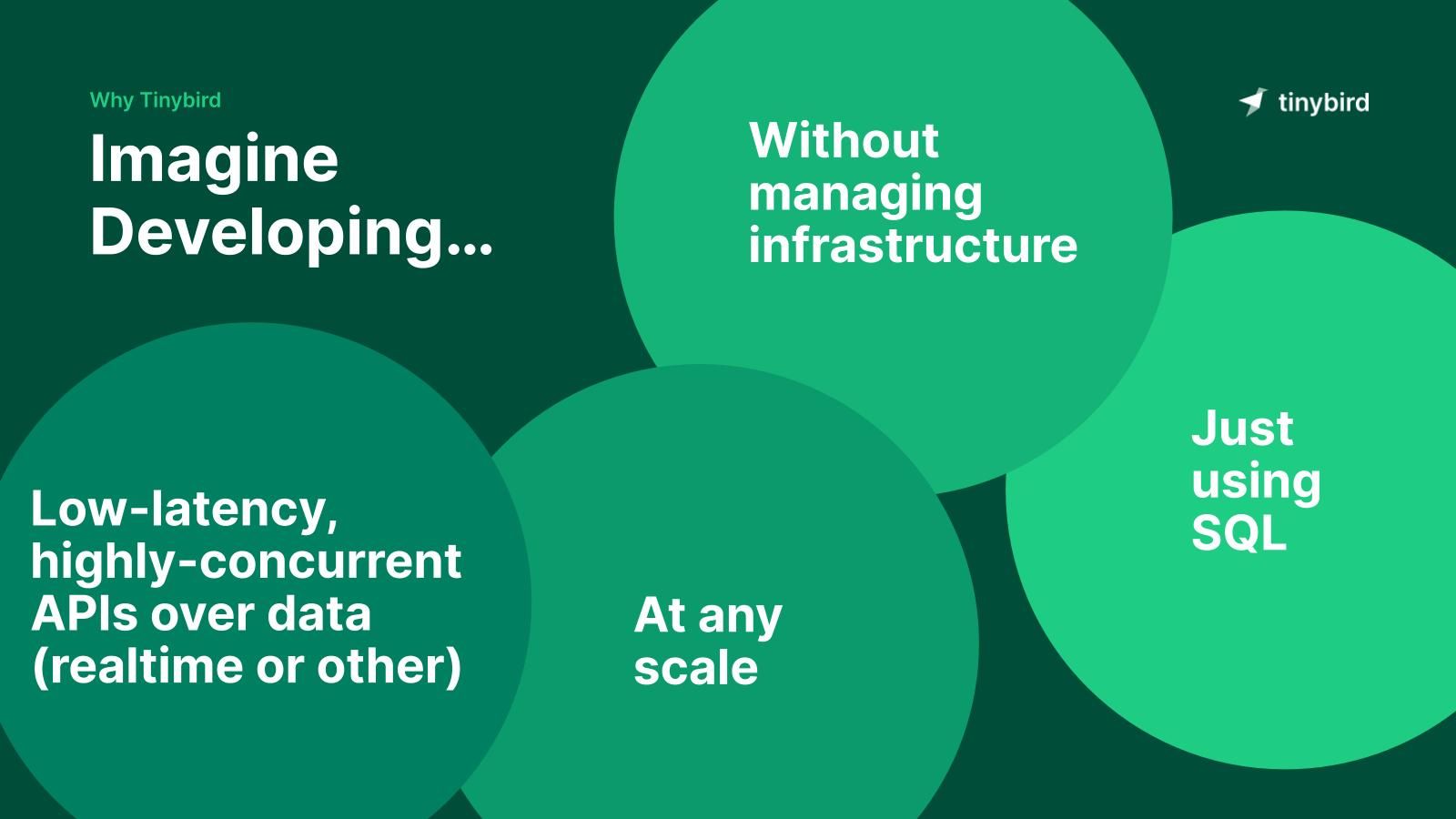
We're built over ClickHouse®, we have an unbeatable speed to market for use cases, it's a serverless model so you don't have to worry about the infrastructure, and it's based on SQL, so developers can and data engineers can use the skills they already have.
It’s for data teams and developers, and you can build through the browser, through APIs, or the CLI.
Tinybird is a modern real-time data platform for developers and data teams. It's serverless, based on SQL, and gives you an unbeatable speed to market.
Obviously, this is a massive simplification, but essentially, for small teams that don't have data engineering teams this is what we enable.
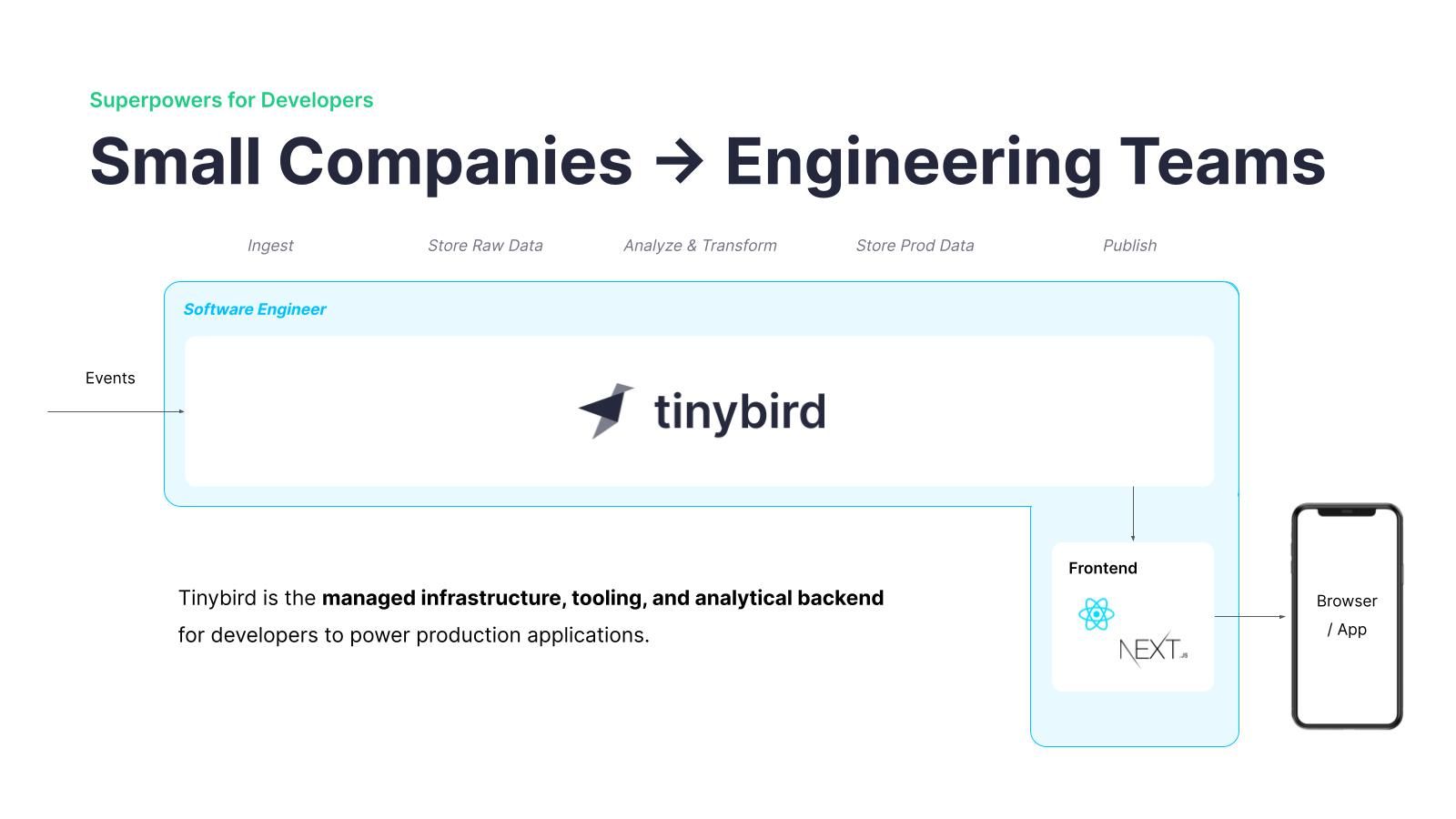
We help them ingest the data, transform it, and publish it with no handoffs. And they can do it without having to rely on SREs or data engineers.
And for larger teams, we enable data engineering teams to enable the software engineering teams within the organizations.
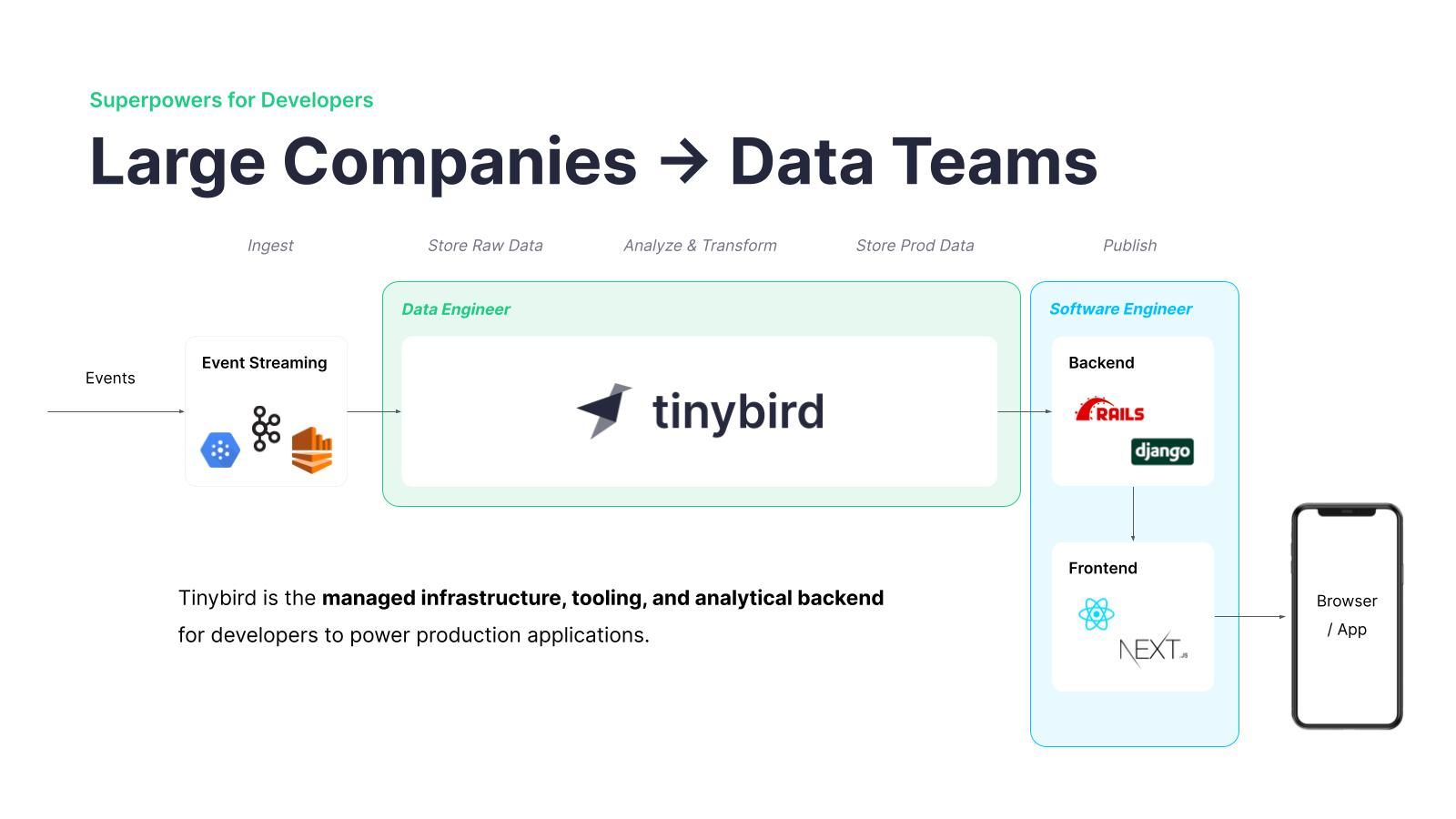
I'm going to quickly finish by m explaining what some of our customers do with Tinybird, and who some of our customers are.
Vercel
I don't know if you know them, but they rely on Tinybird to help developers ship faster.
They started by building Vercel Analytics, which is their user-facing dashboard. All of the telemetry coming from Next.js gets ingested into Tinybird in real-time, and then Vercel creates API endpoints that they consume from their application so that their users see in real time what was the effect of changes to their applications, and how their users are experiencing it.
Once they realized, “Oh, I can have this data here, and I can add more data, and I can mix the data together”, they started doing more things. The next one was a denial-of-service detection and mitigation system like a web application firewall. Essentially they're capturing data from all over their Edge infrastructure and using API endpoints to see if there are denial-of-service attacks in progress.
Once Vercel realized they can bring all this data into Tinybird and mix it together, they started doing even more.
They've also built usage-based billing, logs explorer, and a bunch of other things. Because one of the advantages of Tinybird is that it's so easy to create new use cases. Once the data is in there, every new use case is just an SQL query away. And they don't have to worry about the infrastructure (as long as they pay the bills, of course. 😉).
That's what we do for them.
Global fashion retailer
Another example is the biggest fast fashion retailer in the world. They've gone real-time on top of Tinybird. They started with operational intelligence, building dashboards that the whole company can see in real-time.
And then they've built real-time inventory management, which solves a bunch of problems. For instance. when you're buying something, if they couldn't tell in real-time whether they had stock for that product, there was an estimation. So a lot of people buying would be told, “I'm sorry there's no stock”. This generates a really bad experience. So we help with things like that, plus many other operational use cases.
That includes real-time personalization as well. So when you go to certain countries within their website, personalizations like suggestions on what to buy, are being served by Tinybird.
They're also building a “Google Analytics” on top of Tinybird, so they've used it a lot and we continue growing with use cases.
--
Hopefully this was interesting! If you want to know more about Tinybird, feel free to reach out. Thank you!


